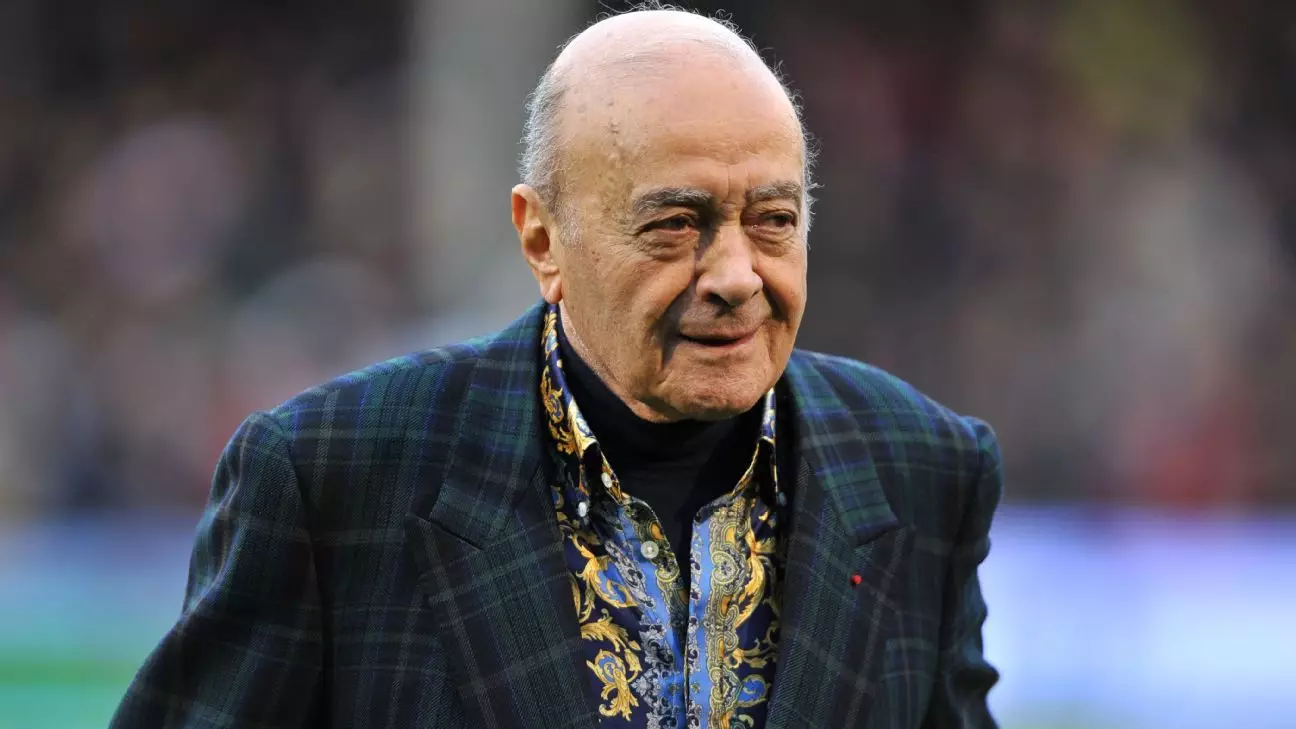The allegations surrounding the late Mohamed Al Fayed, former owner of the London-based football club Fulham and the prestigious department store Harrods, have recently reignited public concern. Accusations of rape and sexual abuse against Al Fayed, portraying him as a “monster,” have been articulated by legal representatives for numerous women in the aftermath of the BBC documentary “Al-Fayed: Predator At Harrods.” These disturbing claims extend across Al Fayed’s extensive career, from 1985 until his death last year, suggesting a sustained pattern of sexual misconduct that permeated both his business and personal life.
Fulham FC’s proactive response to these revelations reflects the seriousness with which the club views these allegations. The management is currently investigating whether anyone within the organization has been affected by Al Fayed’s alleged predatory behavior during his ownership from 1997 to 2013. The club’s commitment to empathy for abuse survivors is commendable, as is their invitation for any potential victims to come forward with information. However, fulfilling this duty of care requires not just sensitivity, but also an unwavering commitment to transparency and accountability throughout the organization.
Al Fayed’s time as a prominent businessman intersects with a disturbing cultural backdrop that often shields perpetrators of sexual violence. Reports have surfaced of alleged assaults—some involving vulnerable individuals—who have described chilling encounters with Al Fayed. Legal representatives have highlighted the disturbing similarities between Al Fayed’s case and those of other high-profile figures, including Jeffrey Epstein and Harvey Weinstein. Each of these men leveraged their positions of influence to exploit and silence those they preyed upon.
In the wake of these allegations, the Metropolitan Police had previously investigated claims against Al Fayed; however, earlier attempts to bring forth charges did not lead to prosecution. This raises critical questions about systemic failures in addressing sexual misconduct, especially when it concerns individuals of significant social standing. The apparent impunity enjoyed by Al Fayed during his time at Harrods represents a troubling acceptance of predatory behavior that demands collective reassessment from institutions and communities alike.
The poignant testimonies from the women advocating for accountability bring the harrowing experiences of potential survivors to light. One accuser, identified only as Natacha, offered a candid account of her ordeal and described moments of fear and manipulation that many associate with predatory relationships. The terrifying circumstances surrounding her invitation to Al Fayed’s apartment underline a pattern of coercion where vulnerable individuals are targeted in the guise of professional engagement.
Her disclosure, while painful, serves a greater purpose—shattering the culture of silence surrounding abuse. By sharing their experiences, survivors like Natacha contribute to a clarion call for justice, urging prospective victims to speak out against predators. Their voices, once stifled, challenge the societal norms that often marginalize or disbelieve victims of sexual misconduct.
In light of the accusations against Al Fayed, greater scrutiny is warranted on the institutions affiliated with individuals who wield power irresponsibly. Harrods’ new ownership has expressed dismay at the allegations but previously denied knowledge of them. This stance raises concern regarding the organization’s accountability during Al Fayed’s tenure. As the institutional memory around Al Fayed’s alleged abuses is interrogated, calls for reform become ever more relevant. Creating an environment that not only acknowledges but actively combats sexual misconduct is imperative for any establishment.
The legal representation for survivors insists that organizations like Harrods take substantial responsibility for their past, compelling them to reform their practices and ensure that similar abuses cannot occur again. A clear path forward must involve robust mechanisms for reporting misconduct, a thorough examination of the cultures that allow abuse to flourish, and pathways for healing for survivors.
As society grapples with allegations against powerful figures such as Al Fayed, it becomes increasingly clear that addressing the legacy of such individuals requires more than mere condemnation. It calls for a profound transformation in social, institutional, and legal frameworks that protect victims and hold perpetrators accountable. The struggles of women who have come forward must inspire a collective societal response to eradicate systems of silence and complicity.
While the road toward justice may be arduous, the outpouring of personal testimonies represents a burgeoning movement toward reclaiming agency and dignity. Institutions, organizations, and individuals must unite to build a future where everyone feels safe, valued, and heard—the true legacy that should emerge from the shadows of Al Fayed’s reign.
